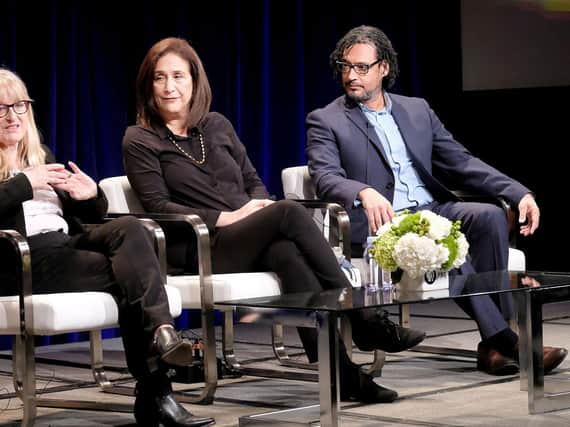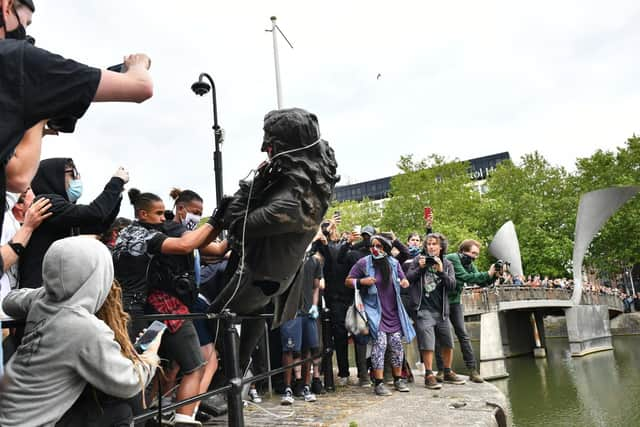David Olusoga on why 2020 has been a big year for the Black Lives Matter movement


However, it is not just the impact of the worst global pandemic in living memory that they will be unpicking; the death of George Floyd in May reverberated not only in the US but around the world, sparking marches in support of the Black Lives Matter movement.
It’s an issue that writer, broadcaster, and film-maker David Olusoga will be discussing in depth when he talks to writer and historian Colin Grant in an online conversation for this year’s Off The Shelf festival later this month.
Advertisement
Hide AdAdvertisement
Hide AdIn recent months we have seen statues toppled, while organisations have confronted their connections to slavery and millions of people have begun to engage with the issues of racism in new ways. So are we seeing a moment of real change? “The traDavid ditional response of a historian is ‘ask me in 50 years’ but I think we have to ask ourselves what things are present in 2020 that weren’t present in the past,” says Olusoga, Professor of Public History at the University of Manchester.


He feels there are a couple of key differences. “The pandemic took older people out of the arena of the public space and gave it to the young and the young have used it to say ‘this is who we are’ and ‘these are our views on this issue’. This generation has a view about race and inequality in all its forms that is radically different from their parents and even more radically different from their grandparents, and I think we are living through one of those phases where you do have a huge generational schism.”
Olusoga grew up in the 1980s and feels his generation was far more apathetic back then. “I was a very politicised teenager and spent most of my time in half empty meetings trying to persuade people to be politically active. But my generation just wasn’t very politically engaged and today’s younger generation is radically different and I have a lot of respect for them,” he says.
“Young white kids don’t want to live in a society where their young black friends and boyfriends or girlfriends suffer worse life outcomes, have fewer opportunities, are fearful of the police, and they are absolutely committed to taking on the systems that perpetuate that.
Advertisement
Hide AdAdvertisement
Hide Ad“I say this with some trepidation, but I think our children are going to hold us to account. They’re going to hold us to account for climate change, they’re going to hold us to account for the mess in the world that we’re handing over, and they’re angry and they have every right to be.” He believes, too, that Millennials have been unfairly maligned. “They want to talk about race, we don’t. They want to talk about climate change, we haven’t.”
In the UK, anti-racism protests in Bristol hit the headlines when a statue of slave trader Edward Colston was toppled in Bristol and thrown into the harbour. The Prime Minister Boris Johnson described it as a “criminal act” but Olusoga argues: “It was not random, it was not thuggery, or violence for the sake of violence.
"Having said all that it should never have happened because that statue shouldn’t have been there. That statue should have been taken and put in a museum 20 or 30 years ago. The reaction that I had from people who sent me messages on social media about that statue was not shock that it had been toppled, but shock that it was still standing. People couldn’t believe that Bristol in the 21st century had a statue of a 17th century slave trader standing on a pedestal in the city centre, a man responsible for an estimated 19,000 deaths.”
The son of a black Nigerian father and a white British mother, Olusoga grew up on council estate in Gateshead and says his interest in history came about by accident.
Advertisement
Hide AdAdvertisement
Hide Ad“I wish I could say it was youthful politicisation, but I was obsessed with the Second World War like every little boy around me back then. And through that I discovered there were black soldiers in the war, which came as a total shock to me. Nothing in my education prepared me for the idea that black people had ever played an active and positive role in British history. So discovering black soldiers fought in the Second World War and the First World War was an accidental discovery but a very welcome one.”
Olusoga experienced racial abuse growing up and, worryingly, he sees some parallels with today. “What I find very frightening about the present moment is it reminds me of the 80s. I’ve not seen the far right as swaggering, as arrogant and dangerous and organised since I was a child,” he says. “Before social media we had a brief period where we could imagine it had gone from people’s minds and social media usefully, though very depressingly, has dragged us out of that delusion.”
Olusoga, whose TV programmes include Black and British: A Forgotten History and the hugely popular A House Through Time, says racism took centuries to build. “When people say racism is systemic it’s not an attack on Britain, and saying racism is systemic is not saying it’s worse than individual racism, that’s just its nature.”
However, he believes we could be on the cusp of genuine change. “More people in 2020 began to read about black British history, they began to read about race. There was a point in June and July when you looked at the Sunday Times bestseller list and in one of those lists five out of the top ten books were about race or black British history, and that’s because people were going out and engaging with those issues,” he says.
Advertisement
Hide AdAdvertisement
Hide Ad“We had a moment this summer where we looked at 30 years of failed diversity schemes and decided it wasn’t good enough. All of the major broadcasters made commitments that to me feel radically different from the commitments made in the past that failed.
“In publishing, all the big publishers are now doing audits, they’re sitting down with the Guild of Black Writers to have discussions about their failings in the past. Organisations and companies in Britain have confronted their historic involvement in the Atlantic slave trade, or colonialism.
“All of these conversations that just weren’t happening where the will could not be found to engage in them, suddenly people found the will to have difficult conversations and to look at the way systems and cultures that they have created disadvantaged people of colour. That’s remarkable and that’s what’s different about 2020 and that’s where we need to be optimistic.”
Black History in the Age of Black Lives Matter – David Olusoga is In Conversation, October 29 at 7.30pm. For more details go to www.offtheshelf.org.uk
Support The Yorkshire Post and become a subscriber today.
Advertisement
Hide AdAdvertisement
Hide AdYour subscription will help us to continue to bring quality news to the people of Yorkshire. In return, you'll see fewer ads on site, get free access to our app and receive exclusive members-only offers.
So, please - if you can - pay for our work. Just £5 per month is the starting point. If you think that which we are trying to achieve is worth more, you can pay us what you think we are worth. By doing so, you will be investing in something that is becoming increasingly rare. Independent journalism that cares less about right and left and more about right and wrong. Journalism you can trust.
Thank you
James Mitchinson
Comment Guidelines
National World encourages reader discussion on our stories. User feedback, insights and back-and-forth exchanges add a rich layer of context to reporting. Please review our Community Guidelines before commenting.